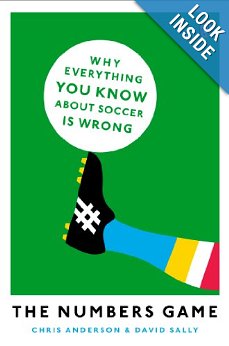Book Review: The Numbers Game
Why Everything You Know About Soccer Is Wrong
The sabremetrics revolution has slowly begun to infiltrate soccer and, as it did with baseball, statistical measurements of the base elements of the game have begun to become commonplace on the field as well as in the management suites. The major soccer clubs of Europe, the U.S., and Canada are all striving to use advanced measurements of the basics of the game to give themselves a leg-up in their leagues, where so often a single result can be incredibly lucrative.
 The book that kicked down the “old school” soccer thinking was Soccernomics, where respected journalists Simon Kuper and Stefan Szymanski incorporated Freakanomics style analysis to the game of soccer and tried to turn the game’s group think upside down.
The book that kicked down the “old school” soccer thinking was Soccernomics, where respected journalists Simon Kuper and Stefan Szymanski incorporated Freakanomics style analysis to the game of soccer and tried to turn the game’s group think upside down.
Seeking to take advantage of the new statistically mindset in soccer, authors Chris Anderson and David Sally have published a new book, The Numbers Game: Why Everything You Know About Soccer is Wrong. The book combines a former keeper turned professor (Anderson) with a behavioral economist (Sally) and tries to answer some of the most basic questions about the game of soccer. By combining an experienced soccer player with some academic understanding, the book tries to answer definitively those questions on which games are won and lost. Inevitably, this book will be compared with Soccernomics as both use a mathematical model to tell the story of soccer. In that respect, The Numbers Game is a much more boring version of Soccernomics. However, that is a very good thing and that is why this book is a valuable read for the serious soccer fan.
The success of Kuper/Szymanski’s book (and its non-soccer predecessor Freakanomics) is based on the use of a few key economic/statistical measures that try and tell an attention-grabbing story. This method leaves their conclusions open to dispute and at times they violate the type of rigorous statistical modeling that they accuse others of violating. The Numbers Game does not do that; rather than cherry-picking topics aimed at attracting the popular media it delves into the most important questions of the game.
The most basic question of course is that of scoring – are soccer’s critics right that the game is by nature a contest devoid of goals. To answer this question, the authors first draw in research in kicks by Prussian horses (yes, it makes sense in context) and uses that study as a comparison for the game of soccer. The result? In Europe’s major leagues (including Serie A) your most likely scoreline is 1-1 with the 1-0 scoreline being the second most likely in a major European match. What about matches like Napoli’s 6-3 win over Cagliari on March 9, 2013? These results can happen, but it much more likely that this match would have ended 1-0.
As you can see with just this one question, this book will appeal to a certain segment of the sports population: gamblers, coaches, hard-core fans, and fans with mathematical backgrounds. That is why I mentioned that this book can be boring – it is not written in a style for the popular masses (and if it is, then the authors failed). But if you are reading this column, you are likely the type of person who would enjoy these kinds of questions and answers. Just be warned, the book builds off of previous chapters, so you need to understand what came before to understand the next chapter.
Once we establish that soccer is by nature a low-scoring game (and they prove that this is a recent but likely permanent phenomenon), the authors then examine other aspects of a low scoring game. During the summer transfer window, my favorite chapter was on overpriced strikers and how a club could best value a potential transfer or signing. Without giving too much away, the authors found that those forwards who scored the second goals in games had the highest value, which led them to classify some lesser-known strikers in the Premier League (their selected league in this chapter) as more valuable than some large names. Additionally, the authors tackle the idea of which is better: a good defense or a good offense.
Some other topics include:
- The ideal time for a team to score its goals
- When a manager should make his substitutions for maximum impact
- Does “the modern manager” even matter to the outcome of a game
- If it’s better to have a few dominant players or a team of good to great players
One important caveat is that many of these discussions relate only to the highest competitions in soccer. Some lower leagues (including at times MLS) have too much of a talent disparity or spending disparity to conform to these statistical models. And this I think is where the book falls a little short but overall is an excellent read and one I would highly recommend to serious soccer fans wanting a statistical understanding of the beautiful game.
Anderson and Sally do a great job taking sound mathematical knowledge to a complex game and breaking it down into its most basic parts to present the modern soccer game: a contest that rely a lot on luck. The authors, despite their good work and probably because they do not want people to just discard their numbers, do not give this point its due.
At the highest competitions, the odds are so even and the stakes so high, much of what happens on the pitch is the result of dumb luck. The team that plans better and has better talent will more often than not win, but when all else is equal there is little but luck to decide a match.
While that is an unsettling thing to say – we want a winner to WIN a match not luck into it – their numbers tell another story. Despite all of our rooting and hoping, it may just be a distracted defender or divot in the ground that will decide a critical match.
Buy this book and enjoy a new way of looking at soccer.


 Send us a timely, compelling post and we'll consider it for publishing on the site with mention of your name and social-media link.
Send us a timely, compelling post and we'll consider it for publishing on the site with mention of your name and social-media link.




